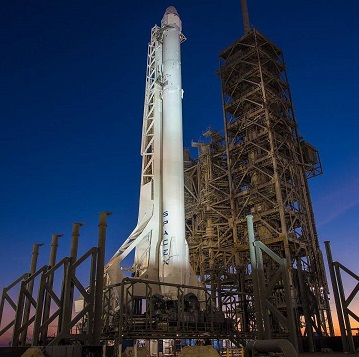The FCC approved SpaceX’s request to fly many of its future satellites for delivering broadband connectivity at a lower orbit than originally planned. That permission was a regulatory hurdle SpaceX needed to clear in order to begin launching its satellites next month. The company says this technology doesn’t need towers or fiber to deliver broadband and would be economical in hard-to-cover areas.
SpaceX asked the Commission in November for the authority to revise its plans for its satellite internet constellation, known as Starlink. Under the original agreement with the agency, the company had permission to launch 4,425 Starlink satellites into orbits that ranged between 690 to 823 miles up. But after conducting testing, SpaceX asked to fly 1,584 of those satellites at 342 miles, reported The Verge. The company believes in the lower orbit, the Starlink constellation will have lower signal latency, cutting down transmission time to 15 milliseconds. The lower orbit also means SpaceX can get the same coverage with 16 fewer satellites.
“Grant of this modification will allow SpaceX to make efficient use of valuable spectrum resources more safely, quickly, and cost-effectively, as it initiates a new generation of broadband services available to customers worldwide, including those in areas previously underserved or even totally unserved by other broadband solutions,” said the FCC in its decision.
“This approval underscores the FCC’s confidence in SpaceX’s plans to deploy its next-generation satellite constellation and connect people around the world with reliable and affordable broadband service,” SpaceX President Gwynne Shotwell said in a statement.
Other companies planning to deliver broadband connectivity via satellite protested the SpaceX change request. OneWeb and satellite operator Kepler Communications both asked the FCC to deny SpaceX’s request. They argued since SpaceX uses similar frequencies, the Starlink satellites could interfere with their satellites if moved to a lower orbit, reported The Verge. There were also concerns about the risk of collisions if SpaceX moved some of its satellites to different orbits.
But the FCC doesn’t believe interference will be an issue. “We find that the modification proposed by SpaceX does not present significant interference problems and is in the public interest,” stated the Commission in its approval. There were also concerns about the risk of collisions if SpaceX moved some of its satellites to different orbits. SpaceX told the Commission its satellites can move out of the way of an approaching satellite in orbit.
SpaceX plans to launch nearly 12,000 satellites to provide internet coverage worldwide. OneWeb launched six satellites in February, Inside Towers reported, the first batch of a planned 650 satellites to provide global internet coverage from low orbits. Amazon recently said it plans to create 3,236 satellites for the same purpose.
The FCC’s approval of the new constellation is conditional on SpaceX launching at least half of these satellites within the next six years. SpaceX plans to beat that deadline.
“Starlink production is well underway, and the first group of satellites have already arrived at the launch site for processing,” Shotwell said. SpaceX plans to launch its first batch of Starlink satellites from Cape Canaveral, Florida sometime in May. Comments? Email Us.
April 30, 2019





Reader Interactions